On May 25, the world watched in horror as video footage of George Floyd’s death circulated online. Minneapolis police officer Derek Chauvin pressed his knee into George’s neck for more than eight minutes while Mr. Floyd lay prone on the street – handcuffed and completely defenseless. Two other officers stood by and watched as Mr. Floyd repeatedly gasped, “I can’t breathe,” until he fell silent after the fourth minute. By-standers pleading with the officers to stop were ignored or pushed further back. At times, Officer Chauvin appeared to relish George’s suffering and the crowd’s apprehension. For many absorbing this footage, it was the most blatant disregard for human life, the most grotesque abuse of power they had ever witnessed.

Protests immediately erupted throughout the United States and across the globe as far away as China, including multiple marches right here in Toronto – a groundswell of civic unrest that has sparked symbolic if not substantive change. Confederate statues have come down in Richmond, Virginia. NASCAR has banned the confederate flag from its events. The Mississippi legislature voted to remove the stars and bars from the state flag after decades of debate. The Washington Redskins and other sports teams with aboriginal mascots are even discussing name and logo changes.
In these dark and tumultuous times, such a seismic response to such a truly depraved tragedy has been heartening. There’s a long way still to go but it’s an encouraging start.
Particularly encouraging, at least to me, has been the vocal and visible involvement of churches and church leaders – across denominations and all along the theological spectrum – decrying the actions and the racially biased structures that contributed to George Floyd’s death. However, there are least two sad and regrettable truths lingering in the background of this recent spate of activism.
The first is this: most of us in the North American Church are more than fashionably late to this movement. For far too long and in far too many situations, pastors, elders, deacons, weekly church attenders, and daily Bible readers have held their tongues. Marches for Civil Rights, campaigns for basic human rights are nothing new. Inequities within the criminal justice system are nothing new. George Floyd wasn’t the first unarmed black man to gasp, “I can’t breathe,” while a police officer choked him to death. Yet, when these disturbingly routine abuses have come to light, a majority of North American churches and churchgoers have elected to stay silent or stand on the sidelines – or both. We’ve deemed such revelations unfortunate but too controversial to wade into. Or, worse, we have judged these abuses to be issues unconcerned with matters of the spirit, and thus undeserving of a place on the docket of congregational concern.
The drawing of such conclusions constitutes the second sad and regrettable truth because nothing could be further from the truth.
We in the North American church have ignored or downplayed these tragedies despite the fact that holy Scripture has long called God’s people to a life devoted to justice, mercy, and the cause of those on the margins. God’s holy prophets testify that justice – in our relationship with God, in our relationship with our neighbours, and in our relationship with the wider community – is an essential and unequivocal priority if we worship the God of Abraham, the God of Jacob, the God incarnate in Christ Jesus. In fact, some of the holy prophets declare justice to be more important and a more accurate measure of our worship of God than any spiritual practice we engage or worship service we hold. Consider these words from the prophet Isaiah (Isaiah 58:1-10):
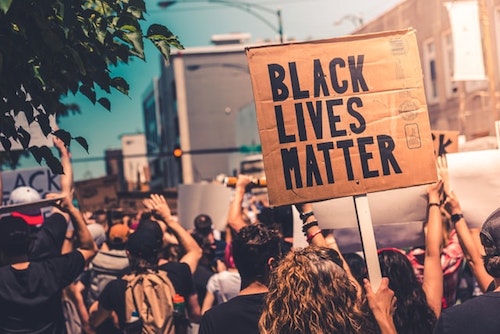
Shout out, do not hold back! Lift up your voice like a trumpet! Announce to my people their rebellion, to the house of Jacob their sins.
2 Yet day after day they seek me and delight to know my ways, as if they were a nation that practiced righteousness, and did not forsake the ordinance of their God; they ask of me righteous judgments, they delight to draw near to God. 3 “Why do we fast, but you do not see? Why humble ourselves, but you do not notice?”
Look [here], you serve your own interest on your fast day, and oppress all your workers.
4 Look [here], you fast only to quarrel and to fight and to strike with a wicked fist.
Such fasting as you do today will not make your voice heard on high. 5 Is such the fast that I choose, a day to humble oneself? Is it to bow down the head like a bulrush, and to lie in sackcloth and ashes?
Will you call this a fast, a day acceptable to the Lord? 6 Is not this the fast that I choose: to loose the bonds of injustice, to undo the thongs of the yoke, to let the oppressed go free, and to break every yoke? 7 Is it not to share your bread with the hungry, and bring the homeless poor into your house; when you see the naked, to cover them, and not to hide yourself from your own kin?
8 Then your light shall break forth like the dawn, and your healing shall spring up quickly; your vindicator[a] shall go before you, the glory of the Lord shall be your rear guard. …[I]f you offer your food to the hungry and satisfy the needs of the afflicted, then your light shall rise in the darkness and your gloom be like the noonday.
And these prophets aren’t just taking issue with our individual behaviour. Amos makes clear that God takes no delight in our public, corporate worship when we, as a faith community, fail to practice justice in our work-week lives (Amos 5:7, 11-12, 21-24).
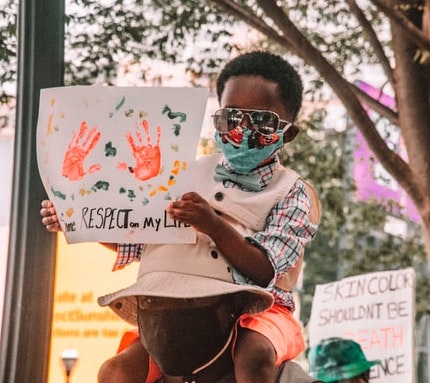
Ah, you that turn justice to wormwood, and bring righteousness to the ground!
Therefore because you trample on the poor and take from them levies of grain, you have built houses of hewn stone, but you shall not live in them; you have planted pleasant vineyards, but you shall not drink their wine.
I hate, I despise your festivals, and I take no delight in your solemn assemblies. 22 Even though you offer me your burnt offerings and grain offerings, I will not accept them, and the offerings of well-being of your fatted animals I will not look upon. 23 Take away from me the noise of your songs; I will not listen to the melody of your harps. 24 But let justice roll down like waters, and righteousness like a mighty stream.
Are you hearing this? This is a point blank rebuke of God’s people, including you and me. Justice isn’t just an aspect of our worship. In a very real sense, justice is our worship. That means we can never dismiss matters of injustice as extraneous political, economic, or social concerns unrelated to our faith practice. If our faith practice is divorced from the suffering, the despair, and the disparity in the world around us, our worship is vain and hollow.
“Justice isn’t just an aspect of our worship. In a very real sense, justice is our worship. That means we can never dismiss matters of injustice as extraneous political, economic, or social concerns unrelated to our faith practice. If our faith practice is divorced from the suffering, the despair, and the disparity in the world around us, our worship is vain and hollow. “
Perhaps no prophet summarises and clarifies this connection between worship and justice more concisely than the prophet Micah. Micah 6 is less bombastic than Amos 5, which may explain why it is more familiar to more of us – and more oft quoted. But I hope you’ll hear that it is no less decisive or directive.
“With what shall I come before the Lord, and bow myself before God on high? Shall I come before him with burnt offerings, with calves a year old? 7 Will the Lord be pleased with thousands of rams, with ten thousands of rivers of oil? Shall I give my firstborn for my transgression, the fruit of my body for the sin of my soul?”
8 He has told you, O mortal, what is good; and what does the Lord require of you but to do justice, and to love kindness, and to walk humbly with your God?
Do justice. Love kindness. Walk humbly with your God. This is what wants from God’s people.
There are at least two things we need to notice in this familiar refrain from the 8th verse of Micah 6. The first is the order in which the Lord’s instructions are presented. Doing justice and loving mercy precede walking humbly. Doing justice and loving mercy are, in fact, part and parcel with walking humbly. We cannot truly walk humbly if we leave justice or mercy behind. Likewise, we cannot do justice and leave mercy or walking humbly to somebody else. This isn’t a multiple choice question. It’s a package deal.
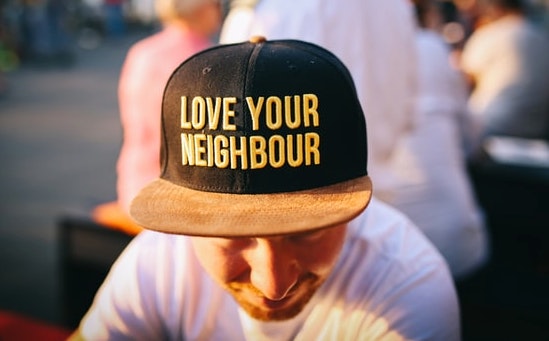
The second thing we need to notice is that justice and love are connected. They’re side by side, they flow into one another. This link is imperative because, for those of us who are students (i.e., disciples) of Jesus, those of us who have taken on Jesus as our rabbi, love is really the first and final lesson. We saw this last week in our consideration of the Greatest Commandment and 1 Corinthians 13. Jesus teaches us that love of God and love of neighbour sums up all the law and the prophets (including Isaiah, Amos, and Micah). Love is the branch from which the leaves of the law and the prophets sprout and grow (Matthew 22:40).
The Apostle Paul then underlines and circles this teaching of Jesus in 1 Corinthians 13. If we don’t have love as the foundation of our discipleship, nothing else really matters. We can speak in the tongues of angels, we can understand divine mysteries, we can have faith to move mountains, we can sacrifice our bodies and all of our possessions for Christ – but if we do not have love, none of it amounts to anything in the final analysis. We gain nothing. We are nothing. Love is what our faith in Christ, what our worship of Christ always comes down to and comes back to. Love is the stance Jesus calls us to adopt in relation to God, neighbour, and self.

Now, we also honestly wondered aloud last week how we can, in any real or practical sense, fulfill Jesus’ instruction to love our neighbours as ourselves – to love our neighbours the way we love our spouses, our children, our closest friends – given everything that love entails. How can we have the time and the energy it takes to cultivate so many relationships of a loving nature? Truth be told, many of our neighbours are people we’ll never get to know well. In a city the size of Toronto, there are millions of people we’ll never get to know at all. We’ll never even meet them. How can we love them? How is it possible?
Justice is the answer.
Justice is the answer because, if love is a stance, a posture that we adopt as Jesus’ disciples, then justice is what should result when we live and act out of such a stance toward our neighbours, our communities, our province, our nation, our world. When we support and advocate for that which is fair and right, for that which creates and provides opportunity for others, we show love to our neighbours because we are showing concern for our neighbours’ well-being, concern for the outcomes of their lives – even if we’ve never met them. Even if we never will meet them. Supporting and advocating for the common good is how we demonstrate that we want the same things for others that we want and expect for ourselves, which is what love always does for the beloved. In the words of Cornel West, “Justice is what love looks like in public.” Love and justice are really two sides to the same coin. And that makes justice a key component of discipleship every bit as much as it is an essential aspect of our worship.
“When we support and advocate for that which is fair and right, for that which creates and provides opportunity for others, we show love to our neighbours…Love and justice are really two sides to the same coin.”
If we still have any doubts or quibbles about that, Jesus braids these themes of worship and love and justice together for us at the conclusion of Matthew 25:
“When the Son of Man comes in his glory, and all the angels with him, then he will sit on the throne of his glory. 32 All the nations will be gathered before him, and he will separate people one from another as a shepherd separates the sheep from the goats, 33 and he will put the sheep at his right hand and the goats at the left. 34 Then the king will say to those at his right hand, ‘Come, you that are blessed by my Father, inherit the kingdom prepared for you from the foundation of the world; 35 for I was hungry and you gave me food, I was thirsty and you gave me something to drink, I was a stranger and you welcomed me, 36 I was naked and you gave me clothing, I was sick and you took care of me, I was in prison and you visited me.’ 37 Then the righteous will answer him, ‘Lord, when was it that we saw you hungry and gave you food, or thirsty and gave you something to drink? 38 And when was it that we saw you a stranger and welcomed you, or naked and gave you clothing? 39 And when was it that we saw you sick or in prison and visited you?’ 40 And the king will answer them, ‘Truly I tell you, just as you did it to one of the least of these who are members of my family,[g] you did it to me.’
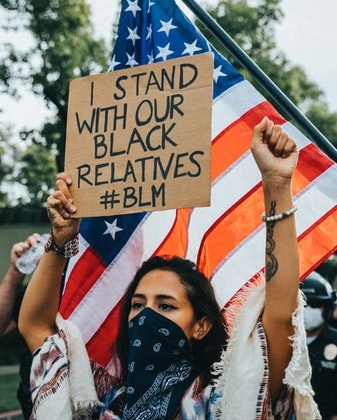
41 Then he will say to those at his left hand, ‘You that are accursed, depart from me into the eternal fire prepared for the devil and his angels; 42 for I was hungry and you gave me no food, I was thirsty and you gave me nothing to drink, 43 I was a stranger and you did not welcome me, naked and you did not give me clothing, sick and in prison and you did not visit me.’ 44 Then they also will answer, ‘Lord, when was it that we saw you hungry or thirsty or a stranger or naked or sick or in prison, and did not take care of you?’ 45 Then he will answer them, ‘Truly I tell you, just as you did not do it to one of the least of these, you did not do it to me.’ 46 And these will go away into eternal punishment, but the righteous into eternal life.”
As you did or did not do unto these, so you did – or did not do – unto Me. As we do or do not do unto those suffering from want, from exposure, from illness, from alienation, from incarceration we do or do not do unto Christ Himself. How we welcome, how we care for, how we provide for the poor, the marginalised, and the oppressed equates directly to how we receive or reject Jesus Himself. That’s how closely, how directly justice relates to worship. That’s how closely acts of justice and mercy resemble acts of love. And so we cannot claim to worship the God who is incarnate in Christ Jesus and not do justice, not do mercy, not do right by others as we walk humbly in the way of Jesus.
That’s who the righteous are – the ones whom Jesus welcomes into eternal life, into the inheritance prepared for them from the foundation of the world. The righteous are the ones who do right by their neighbours, by their fellow men and women, by children other than their own. The righteous are those who are moved to action by the plight of suffering. Right-ness is what righteousness really means. Not goodness. Not piety. Not politeness. Not decency or respectability. Not adherence to doctrine or tradition or ritual. Right-ness. And right-ness is what justice means, too. When we speak biblically of justice, when we speak of justice in relation to God and neighbour, in relation to Christ, we’re not talking about a litigious system of courts and laws. We’re not talking about punishment or revenge. We’re not talking about “having” justice or “seeking” justice; we’re talking about “doing” justice: doing what is right. In fact, quite often in the Bible, what we translate as “righteousness” in some verses and “justice” in other verses is the same underlying word – in both Hebrew and Greek. Once again, it’s a package deal.
So when we contemplate what it means to do justice as the people of God, as the people of Jesus, we’re not talking about jurisprudence (at least not specifically or exclusively); but we are talking about the public square. We are talking about systems and structures. We are talking about more than individual acts of generosity, more than handing a dollar to a homeless man, more than filling a bag of groceries as a volunteer at the food bank. Not that we shouldn’t do those things. We should – and I hope you do. It’s not that we shouldn’t do those things, it’s that we should do more than those things. Because these small, individual, isolated gestures don’t satisfy what Jesus is describing, what the prophets are demanding. Those small, individual gestures don’t set things right. If love lies beyond kindness, then justice necessarily lies beyond charity. Justice seeks to remedy the causes of need not just to alleviate the symptoms of need. Justice seeks to set things right.
“If love lies beyond kindness, then justice necessarily lies beyond charity. Justice seeks to remedy the causes of need not just to alleviate the symptoms of need. Justice seeks to set things right.”
Isaiah and Amos have already told us this. But it becomes abundantly clear if we keep reading in Micah 6. Here’s how Micah 6 continues after that famous and familiar 8th verse, in verses 9 through 12:
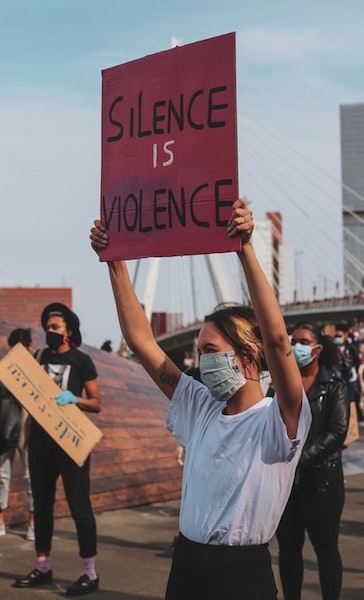
The voice of the Lord cries to the city
(it is sound wisdom to fear your name):
Hear, O tribe and assembly of the city!
10 Can I forget the treasures of wickedness in the house of the wicked,
and the scant measure that is accursed?
11 Can I tolerate wicked scales
and a bag of dishonest weights?
12 Your wealthy are full of violence;
your inhabitants speak lies,
with tongues of deceit in their mouths.
Wicked scales. Dishonest weights and measures. Violence, lies, and deception. God’s prophet is calling out injustice in the public square: in commerce, in the structures and practices and interactions of daily life; in the accumulation of wealth and power by a select few who obtain it and maintain it through force and deceit – force and deceit they condone even if they themselves do not perpetrate it.
This is the justice we are called to, my brothers and sisters: Seeing, naming, and calling out what isn’t right in the world around us. Wrestling with and coming to grips with our own complicity and participation in the unjust systems and perverse values of the world around us. Then working to set things right. Justice, like worship and love, is active. It is intentional. It is relational. It must be done; it does not and will not simply occur. And isn’t that precisely what God through Micah asks of us? To do justice.
“This is the justice we are called to, my brothers and sisters: Seeing, naming, and calling out what isn’t right in the world around us. Wrestling with and coming to grips with our own complicity and participation in the unjust systems and perverse values of the world around us. Then working to set things right.”
And there is much to do. It’s been three months since those Minneapolis police officers sworn to serve and protect murdered George Floyd while he was in their custody. We and the world are more aware of this tragic, perverse, and insidious bias than we were; but things still have not been set right. The world-wide demonstrations have dwindled; however, the shootings have not. Just this past week, on August 23rd, almost three months to the day of George Floyd’s execution, a Wisconsin police officer shot Jacob Blake seven times in the back at point blank range. Then, two days later, a 17-year-old vigilante shot and killed two Kenosha locals protesting Blake’s death. In between, some pundits and their fans have been trying to minimize, if not justify, George Floyd’s death. There were drugs in his system, they say. He had a heart condition, they say. As if those circumstances excuse Derek Chavin’s negligence and brutality. This is what we face, and will continue to face, even as the headlines change. And who knows how tomorrow’s headlines will read.
But no matter what those headlines will be, they will be matters for God’s people, for Jesus’ people, to grieve and engage and challenge – however, whenever, and wherever despair or disparity, injustice or inhumanity are uncovered. We cannot continue to be late or absent from justice movements because it is our calling as disciples of the crucified and resurrected Jesus to give voice to the voiceless and shine light in the darkness; to feed the hungry, refresh the thirsty, clothe the naked, welcome the stranger, tend the sick, and be present with the imprisoned. It is our calling to live and vote beyond what benefits us – beyond our own interests, beyond our own comfort. Because justice is what love looks like in public, and Jesus has declared the world will know us by our love.
May we be so known. And may Christ be known in us and through us. Amen

























